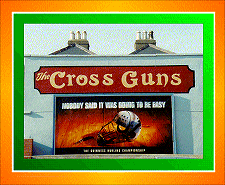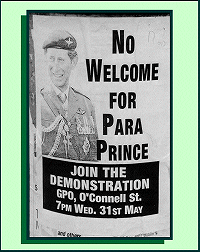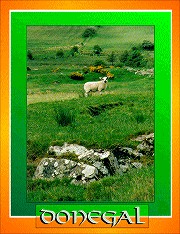
Dublin looked less like a capital city than any other capital city we encountered in Europe, even when compared to a city of similar relative economic standing, Athens. Whereas most cities take pride in their history, Dublin's affection for its history seemed dubious. The greatest architecture sights in Dublin are the Georgian buildings , the lesser ones of which have been allowed to go into a state of disrepair. The monument lined O'Connell Street has statues that honor Irish nationalists, but are the same that stood on the street before independence was gained. There is no statue to de Valera, P.H. Pearse, or Michael Collins, but a statue honoring the British naval genius of Admiral Nelson was blown to pieces in the 1960's.

Vestiges of English control over Ireland can still be seen even in the language of the money. The most common Irish unit of money is still the pound, though now it is the Irish pound rather than the English pound. Maybe its the radical nationalists who have unsuccessfully pushed for the use of the word "punt", but the mainstream public is conservatively behind tradition. In fact Irish coins in general show a lack of nationalist resolve. In the days under the Dominion, Irish coins had a harp with a crown on top. Several decades after regaining independence, Ireland has yet to put a nationalist hero even on her coins (only animals appear on Irish coins) and the harp remains only without the English crown. Alas, I was even given English coins mixed in with my change in Ireland.
The British, for their part, seem to do what they can to perpetuate the tie with Ireland and I'm not just referring to the situation in Northern Ireland. When we were at Gatwick Airport near London, I walked toward an entry way that was labeled "International" when the guard asked me where I was going I told him "Ireland." He told me to go down the hall where I found out that Ireland was lumped together with Northern Ireland, and (if my memory serves me correctly) "other Great Britain destinations."

The police in Ireland seem less threatening than police I have ever seen. I've seen security guards on mopeds that look more threatening. I wonder if there is a reason that Dublin is the first place I have ever seen two policewomen patrolling together.
While in Dublin, a nuance of the Irish character that I picked up on was an embarrassingly strong sense of guilt (Catholic!?). "I'm sorry" is used by young and old alike as "excuse me" or "pardon me" is used in America, or the equivalent used in France, Italy, or Spain. The usage of "I'm sorry" to get past someone was quite perplexing to me given the fact that the Dubliners don't walk uniformly on one side of a path and often walk into you rather than avoid you. I hypothesized that the usage of "I'm sorry" might reflect a sense of provincialism until I saw a French expression on a sign in a northern Dublin neighborhood that warned of a "cul de sac." If it was a disliking for Romance languages, Dubliners would likely have used "please" such as the German "bitte". Afterall, the English spoken by Dubliners is a Germanic language. Perhaps it is because "I'm sorry" is more akin to the Catholic influenced Gaelic that it is used instead of the French and Spanish or German expressions. Maybe it's even more obfuscated than that, the French, Spanish and Germans were all ineffectual aids to Irish attempts at resting themselves from the yoke of Britannic imperialism.

Prince Charles had visited Dublin a week or two before we arrived and some demonstrators had thrown eggs at him, but missed. One of the several bills we saw up around Dublin said "CHARLES is NOT welcome. Colonel-in-Chief of the Paras represents 826 years of invasion, famine and death." So I asked our cab driver if he knew anything about the egg-throwing incident. He said it was "only a small minority" who caused the problems and added that it was bad for Ireland that such a thing should have happened. He said most people just ignored the visit which was for a good cause. Then I asked him about Northern Ireland and the pending peace talks. I asked him if he thought the North might be joined with the Republic. He confidently said "the people up there don't want it, and there's no money." He also said that the social welfare system is totally different "there and here," and concluded with "it will never happen."

The woman who ran the B&B we stayed at in Dublin told us that what our map book showed as Londonderry was called Derry by "everyone here," even though the name was changed by the English several hundred years ago. The destination signboard at the train station and all the direction signs on the road north also said "Derry"("Doire" in Gaelic). It wasn't until we passed an unmanned zigzagged, steel fortification (presumably unmanned since peace had broken out) which made it clear to us that we were in Northern Ireland, that the spelling changed. A sign on the road just before the checkpoint warned "PHOTOGRAPHY FORBIDDEN". Derry became Londonderry and the Gaelic language was dropped from road signs. Some in Derry seemed to have struck a compromise (or were protesting?) over the name issue. I saw a public bus and advertising on vehicles where the town name was spelled L'DERRY.

I asked an agent at a car rental agency about a walled, turreted, and barbed wired facility that a passerby had explained was a police station and barracks. She told me that there was a second one on the opposite side of the lot from where we had come. Before peace broke out nearly a year previously, Strand Street (where the first barracks were located) was blocked off to traffic, and everyday going into work all vehicles were subject to search on the opposite side of a river that was just outside of town. She explained that she grew up with the heavy security, but now that she has lived without it she doesn't know how people could go back to the way things were.
We spoke with an Irish gentleman over breakfast near Burnfoot, County Donegal a few miles from Derry. He had grown up in the area and was returning (presumably to retire). He had worked for Bank of America first in Dublin and then in London. We talked for a bit about the troubles in Ulster and Derry specifically. He explained that the RUC (Royal Ulster Constabulary; the police in Ireland prior to gaining independence were called the RIC or Royal Irish Constabulary) was principally made up of Protestants. Referring to the years before IRA activities resume in the 1960's, he said that life was difficult if you belonged to the wrong religion (Catholic) even though the city and county of Derry, according to him, were predominantly Catholic. He illustrated this with three brief stories: (1) Sometime in the 1940's he had gone to a store to pickup some things. As he left the store and walked towards his car, he noticed there were several RUC surrounding his vehicle. Realizing that they couldn't have any interest in his car being anything especially nice, he asked them "Can I help you with anything?" One of the RUC men walked up to him and asked him if he knew he was parked in a restricted area. Slightly perturbed, he responded "No. If I had known this was a restricted space I wouldn't have parked here. I was just inside the store for a minute to get these things." The RUC then said, "Okay. We'll just excuse this to your Southern Irish [Irish Catholic] ignorance." (2) His cousin, who was attending Queens University (Belfast), was one of the few Catholic members of the RUC (apparently this had something to do with his enrollment at Queens University). There was a luncheon of some kind for the RUC and all the Catholics were made to strip naked and march around outside in the bitter cold. (3) Then there was a St. Patrick's Day parade on Shipquay Street, the main street in Derry, which has a steep incline. The RUC commandeered a couple of the horse drawn floats near the top of the hill, and unhitched the floats from the horses effectively ruining the parade as the floats rolled down the hill.
He explained that these events had been indicative of life for the Catholic in Northern Ireland, and that now the Protestants have called for peace because they are scared (his father was an IRA man-"the old IRA"). He felt sympathy for the British soldiers who he saw as "young boys of seventeen and eighteen who knew nothing about religion or the traditions of Ulster."
We drove past Letterkenny in Donegal and saw a double-sided billboard that said "Free all political prisoners" in English, German, and French on one side, and "Peace through British withdrawal" on the other.
We spoke to a man from Strabane in Ulster while we were in County Mayo (he had noticed that our rental car was from Northern Ireland). He described himself as a Nationalist and agreed with what the woman we had met at the car rental agency had said about peace having broken out and how it would be difficult to go back to the friction that existed before. He said that more people from the North are coming down South now that peace has broke out. Over the last twenty-five years Catholics were not allowed into some stores by the security forces because there was a threat they might have explosives. I asked him how, other than in a small community where everyone knows each other, people knew who was Catholic and who was Protestant. "It is obvious by the way you talk," he said. As an example he gave the name of the town of Derry. Catholics stopped on the roadside and asked about Londonderry would only respond with "this is Derry". He said that Protestants always referred to the city as Londonderry.
I asked him if children were educated about the Northern Ireland conflict in school or at home. "Those who had an IRA member in their families in the past would be taught hate for the Protestants." He said that it was more than a religious issue and implicitly referred to the plantations of the Scotch and English in the seventeenth century. He felt the most immediate threat to the peace process was the issue of one group marching in the area of another group. Catholics had been allowed to march in a Protestant area "and the tricolors were taken and burned by the Protestants during the procession." He said that the Protestants then wanted to have a peace march in a Catholic area and the security forces said, "No. Each group is to stay in their own area for now on."
Meanwhile, there was talk in the press about the English demanding the IRA to give up their arms before talks continue. Several decades earlier when the original IRA (which avoided killing innocent civilians unlike its contemporary namesake who seems to target the innocent as a means of inciting "terror") was fighting for Irish Independence the same demand was put on the table, but was a huge failure.


Ireland is the land of blue eyes, milky-white skin with rosy-red cheeks, a smattering of freckles, and not a little bit of orange hair. It's the land of breakfast: a fried egg, sausages of two kinds, bacon and ham in one strip, toast, orange juice, tea or coffee, and cold cereal. It's the land of the pub and grub with names like The One Foot Inn and The Just Inn. It's the home of a dark pint of Guinness with a head of tan cream on top. It's the land where boundaries are often marked with knee-high gray stones of irregular shape, sheep, cows, and soil rich enough for growing every shade of green imaginable yet too poor to grow much else. It's the land of those Irish Catholic stone crosses with a circle and Gaelic carvings. Probably the only place in the world where death notices are broadcast on the radio prior to funerals. It's the land of the ancestral names to millions of Americans and Australians. It's the land where Gaelic was kept alive and the 26 counties gained their freedom after as long as 700 years under Britannic Imperialism.


